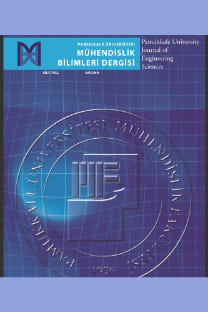Farklı krank mili hızları için buji ateşlemeli bir motorun ekserji analizi
Bu
çalışmada, buji ateşlemeli bir motorun performansı farklı krank mili hızları
için ekserjetik olarak incelenmektedir. Test motoru 95 oktan benzin yakıtlı
VSG413 SI türü motordur. Test motoru 1.3 l hacim, dört strok, dört silindir, 45
kW’lık maksimum güç kapasitesi ve 98 Nm’lik maksimum tork kapasitesine
sahiptir. Deneyler tam yük test koşulları altında gerçekleştirilmiştir. Krank
mili hızı 1200 d/d ve 5000 d/d aralığında değiştirilmiştir. Hesaplamalarda,
deneylerden elde edilen gerçek çalışma verileri kullanılmıştır. %29.78’lik
maksimum enerji verimi ve %27.77’lik maksimum ekserji veriminin 2500 rpm’lik
krank mili hızında elde edildiği tespit edilmiştir. Entropi üretimi krank mili
hızının artmasıyla artmaktadır ve bütün çalışma boyunca 0.059 kW/K ile 0.253
kW/K aralığında değişmektedir.
Anahtar Kelimeler:
Buji ateşlemeli motor, Ekserji analizi, Ekserji verimi, Ekserji yıkımı
Exergy analysis of a spark ignition engine for different crankshaft speeds
In
this study, a spark ignition (SI) engine performance is exergetically
investigated for different crankshaft speeds. The test engine is VSG413 SI type
engine fueled with 95 octane gasoline. The test engine has 1.3 l volume, four
stroke, four cylinder, 45 kW maximum power capacity and 98 Nm maximum torque
capacity. The experiments are realized under fully loaded test conditions. The
crankshaft speed is changed between 1200 rpm and 5000 rpm. In the calculations,
actual operating data obtained by experiments are used. It is found that
maximum energy and exergy efficiencies are obtained at crankshaft speed of 2500
rpm, which are 29.78% and 27.77%, respectively. Entropy generation rate
increases with increase in crankshaft speed and ranged from 0.059 kW/K to 0.253
kW/K for all study.
___
- Dincer I. “Thermodynamics, exergy and environmental impact”. Energy Sources, 22(8), 723-732, 2000.
- Dincer I, Rosen MA. “Exergy as a driver for achieving sustainability”. International Journal of Green Energy, 1(1), 1-19, 2004.
- Rakopoulos CD, Giakoumis EG. “Second law analyses applied to internal combustion engines operation”. Progress in Energy Combustion Science, 32(1), 2-47, 2006.
- Caliskan H, Tat ME, Hepbasli A. “Performance assessment of an internal combustion engine at varying dead (reference) state temperatures”. Applied Thermal Engineering, 29(16), 3431-3436, 2009.
- Kopac M, Kokturk L. “Determination of optimum speed of an internal combustion engine by exergy analysis”. International Journal of Exergy, 2(1), 40-54, 2005.
- Li Y, Jia M, Chang Y, Kokjohn SL, Reitz RD. “Thermodynamic energy and exergy analysis of three different engine combustion regimes”. Applied Energy, 180, 849-858, 2016.
- Khaliq A, Trivedi SK, Dincer I. “Investigation of a wet ethanol operated HCCI engine based on first and second law analyses”. Applied Thermal Engineering, 31(10), 1621-1629, 2011.
- Sayin C, Hosoz M, Canakci M, Kilicaslan I. “Exergy and energy analyses of a gasoline engine”. International Journal of Energy Research, 31(3), 259-273, 2007.
- Canakci M, Hosoz M. “Energy and exergy analyses of a diesel engine fueled with various biodiesels”. Energy Sources, Part B: Economics, Planning, and Policy, 1(4), 379-394, 2006.
- Azoumah Y, Blin J, Daho T. “Exergy efficiency applied for the performance optimization of a direct injection compression ignition (CI) engine using biofuels”. Renewable Energy, 34(6), 1494-1500, 2009.
- Kanoglu M, Dincer I, Rosen MA. “Exergetic performance investigation of a turbocharged stationary diesel engine”. International Journal of Exergy, 5(2), 193-203, 2008.
- Caliskan H, Tat ME, Hepbasli A. “A review on exergetic analysis and assessment of various types of engines”. International Journal of Exergy, 7(3), 287-310, 2010.
- Sezer I, Bilgin A. “Exergy analysis of SI engines”. International Journal of Exergy, 5(2), 204-217, 2008.
- Ameri M, Kiaahmadi F, Khanaki M, Nazoktabar M. “Energy and exergy analyses of a spark ignition engine”. International Journal of Exergy, 7(5), 547-563, 2010.
- Jehad AAY, Ozcan H, “Second law analysis of an LPG-powered 4-stroke SI engine under variable stroke length and compression ratio”. International Journal of Exergy, 8(2), 113-127, 2011.
- Razmara M, Bidarvatan M, Shahbakhti M, Robinett RD. “Optimal exergy-based control of internal combustion engines”. Applied Energy, 183, 1389-1403, 2016.
- Li Y, Jia M, Kokjohn SL, Chang Y, Reitz RD. “Comprehensive analysis of exergy destruction sources in different engine combustion regimes”. Energy, 149, 697-708, 2018.
- Jafarmadar S. “Exergy analysis of hydrogen/diesel combustion in a dual fuel engine using three-dimensional model”. International Journal of Hydrogen Energy, 39(17), 9505-9514, 2014.
- Paul A, Panua R, Debroy D. “An experimental study of combustion, performance, exergy and emission characteristics of a CI engine fueled by diesel-ethanol-biodiesel blends”. Energy, 141, 839-852, 2017.
- Cengel YA, Boles MA. Thermodynamics: An Engineering Approach. 5th ed. New York, USA, McGraw-Hill, 2006.
- Kotas TJ. The Exergy Method of Thermal Plant Analysis. Florida, USA, Krieger Publishing Company, 1995.
- Bejan A. Advanced Engineering Thermodynamics. 3rd ed. New York, USA, John Wiley & Sons, 2006.
- ISSN: 1300-7009
- Başlangıç: 1995
- Yayıncı: PAMUKKALE ÜNİVERSİTESİ
Sayıdaki Diğer Makaleler
Çapraz sevkiyatta kamyon çizelgeleme problemi için çözüm yaklaşımları
Gül TEKİN TEMUR, Yelda TURGUT, Abdurrahman YILMAZ, Şafak ARSLAN, Alper CAMCI
Biyodizel kaynaklı korozyon ve bozunma: Bir inceleme
Muhammet Kaan YEŞİLYURT, İlhan Volkan ÖNER, Efe Çetin YILMAZ
Küçük ve mikro ölçekli enerji yatırımı için hibrit enerji modeli
Yapıştırma bağlantılı kompozitlerde yapıştırma geometrisininin gerilme dağılımına etkisi
Fe3O4/FeO/CoNi kompozit malzemenin sentezi ve manyetik özelliklerinin incelenmesi
Gerçek bir sınav çizelgeleme problemi için iki aşamalı çözüm yaklaşımı
